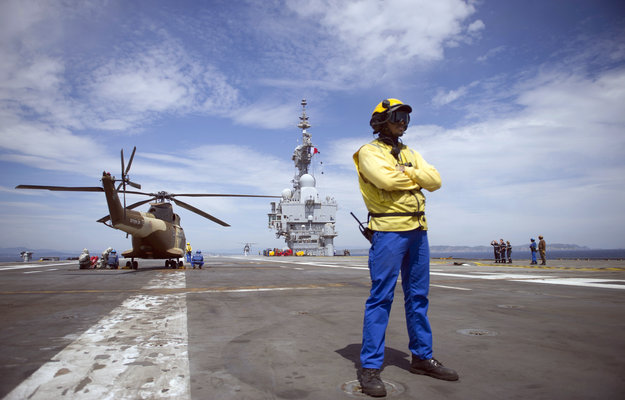
From Kurt Volker, Foreign Policy: [T]ake it from a die-hard Atlanticist: Despite this good outcome, it would be a mistake to chalk this up as a success for NATO. Indeed, it is more accurate to say it is a success despite deep-rooted problems that still remain unaddressed within the alliance. . . .
The mission problem: NATO defined its mission in Libya as protecting civilians and humanitarian relief. But even the most casual observer concluded (as I did five months ago) that there was no way to protect civilians so long as Qaddafi remained in power. And though NATO did strike some central command installations in the heart of Tripoli, killing some members of the Qaddafi family, the alliance had explicitly ruled out "regime change" as a goal — so for several months, there was a distressing lack of seriousness of military purpose.
This changed in recent weeks as Britain, France, and Italy (with U.S. support) put special forces advisors on the ground, provided equipment, established tactical communications and intelligence cooperation with the rebel forces, and coordinated NATO air attacks with rebel advances. But these decisive efforts took place despite the official NATO mission, not because of it. And as long as it worked, more squeamish allies could look the other way. . . .
The leadership problem: Compounding the confusion from the muddled mission was a confusing message about alliance leadership. After playing a major role in the initial wave of airstrikes, the United States abruptly pulled back from the mission, saying — in the words of President Barack Obama — that Washington was "handing over to NATO" the operational lead. . . .
Ironically, the tendency to think of NATO as "them" has long been the pattern in Europe, where NATO is often synonymous with "the Americans." So when both the United States and Europe think of NATO as "them," who exactly takes ownership of the alliance? Instead of bowing to this trend, both sides of the Atlantic need to reaffirm their own responsibility for NATO if it is to mean anything in the future.
The execution problem: Years of European countries hollowing out their defense budgets — even while taking part in an expensive operation in Afghanistan — demonstrated that the majority of European allies now lack the capabilities to take on even a basic military mission such as a no-fly zone without the United States. . . .
The solidarity problem: [I]f solidarity started fraying in Afghanistan, in the case of Libya it went out the window. Several allies did not take part at all — in some cases because they lacked relevant capabilities, itself a blemish; in others because they chose to limit their roles to zero, or inconsequential elements of the mission.
And the United States itself became a caveat country, putting limits on the roles it would play and specific capabilities it would contribute in support of the NATO mission in Libya. No doubt, defenders of the U.S. approach will claim differently — that the United States is leading in Afghanistan, has other responsibilities, and was willing to provide critical, unique combat support assets for Libya. But politically, the United States has now made the case in practice for why caveats are acceptable — and that is a tragedy for NATO as a whole.
None of this is to say that NATO is down for the count. But if we think of Libya as a NATO success story, we will never get to the bottom of the major problems still plaguing the alliance.
And, to be sure, we still need NATO: In a world in which ideological, military, economic, political, and sheer chaotic threats are growing, Europe and North America — these twin pillars of democratic values in the world — need to act together more closely than ever before.
But to restore NATO to its position as the world’s preeminent military alliance, which it was and which it should be, we need to make a realistic assessment of the problems that the Libya operation exposed and work hard to overcome them before the next time NATO’s capabilities are needed.
Kurt Volker, a Senior Advisor to the International Security Program and member of the Atlantic Council’s Strategic Advisors Group, is a former US Ambassador to NATO. (photo: AFP/Getty)
Image: afp%208%2023%2011%20NATO%20Libya.jpg
